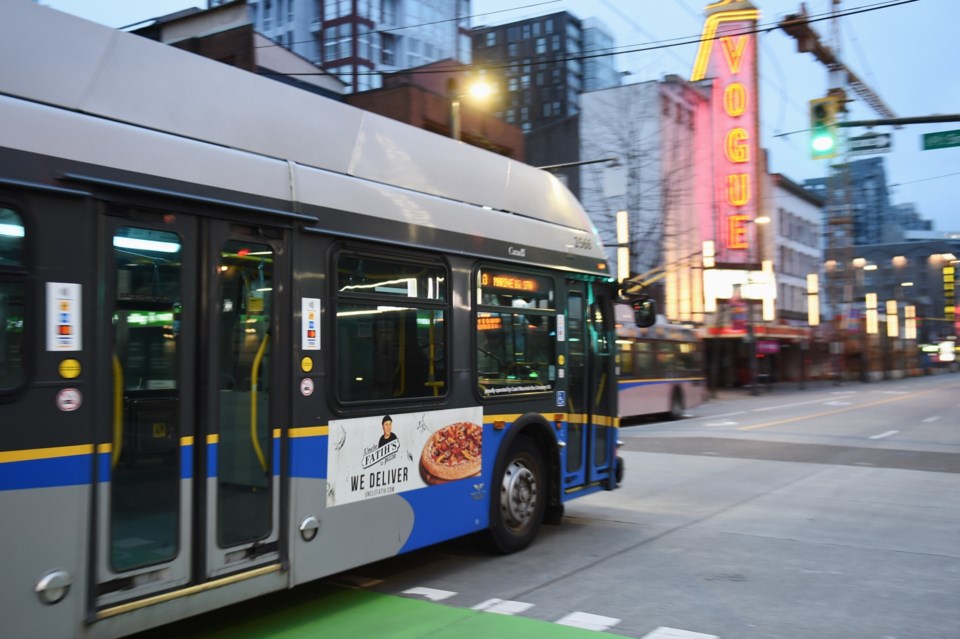From the beginning of TransLink, way back in 1999, its biggest problem was abundantly clear: money. There wasn’t enough, and the only ways to generate the required funds were deeply unpopular hikes to property taxes, gas taxes and ticket prices.
Fast forward almost 25 years, and pretty much nothing has changed.
A new report from TransLink last week warned of massive service cuts of as much as 50 per cent of bus service, 30 per cent of SkyTrain, 30 per cent of SeaBus and maybe all of the West Coast Express, unless Victoria and Ottawa come to the table with a massive $600-million annual operating fund bailout.
That’s not the only solution, mind you. But it was the only one mentioned in TransLink’s report — a document commissioned by Metro mayors to smoke out B.C.’s political parties into public responses on the eve of an election campaign.
The BC Conservatives took the sharpest tone, saying TransLink cannot continue to run on multibillion-dollar provincial bailouts, and that it needs a stern-to-stem audit to figure out sustainable long-term funding. As a guy with a real shot at being premier, it’s a stop-and-take-notice moment for Metro mayors.
The Conservative position fits into a narrative the party is crafting about how the BC NDP government has shovelled billions of tax dollars unchecked into areas like health care, transit, public safety and child care — with pitiful results to show most people. What’s needed, the Conservatives argue, is a change in direction, not more money.
Premier David Eby, meanwhile, strongly suggested the opposite: he’ll just give TransLink whatever amount it says it needs in the NDP’s upcoming election platform.
BC United Leader Kevin Falcon didn’t outright promise a bailout, but he did announce a second bridge to North Vancouver, and expanding SkyTrain to that community — both of which, presumably, necessitate more operating funds.
Then again, it was Falcon who as transportation minister in 2007 overhauled TransLink and took away much of the decision-making from elected officials and gave it to a board of experts (a structure that lasted seven years). So don’t underestimate his willingness to retool TransLink again as premier.
You can trace TransLink’s funding problems back to 1998 and a founding promise from the then BC NDP government that a $75-per-vehicle levy would help subsidize the system. But the idea proved unpopular, and the NDP never actually implemented the mechanism.
Ever since, there’s been tension between mayors who don’t want to use the remaining funding levers — property taxes, gas taxes and ticket prices — and a provincial government who doesn’t want to give them new ones — mobility pricing, a slice of the carbon tax and other imaginative proposals.
All sides are consumed with the worry about public backlash.
If mayors raise property taxes too much, they get an earful from angry homeowners. If the province allows road pricing or vehicle levies, it gets an earful from angry suburban commuters. Raising gas or carbon taxes seems politically impossible when opposition parties provincially and federally are fighting to “axe the tax” in both streams.
And raise ticket prices to a level that actually sustains the system? Forget it. Politicians at all levels of local and provincial government would get pilloried by charging more to those who can least afford it.
To be fair, TransLink is increasing transit fares by 2.3 per cent this year, 4 per cent next year and 3 per cent the following year. But it’s not enough to keep up with costs. The gas tax, meanwhile, is on the decline as motorists shift to electric vehicles.
Mayors have proposed a property tax increase worth $3.08 a month for the median household. But successive provincial governments have argued there’s more room there for hikes, because the province long ago exempted Metro Vancouver from having to pay 40 per cent of local hospital capital projects, with the explicit understanding they use that property tax room for transit instead.
Mayors counter by pointing out how often Victoria bigfoots them out of the way on transit planning to build whatever pet transit project captures the eye of the premier of the day, and argue the province should therefore be at the table with more money.
And around and around in a circle we go. More than 25 years of this now.
Even if TransLink receives its $600-million annual bailout from the next government, history tells us the organization and mayors will need more soon.
Structurally, the transit system just doesn’t cover its costs. It was never given the tools to do so. And the ones that do remain, everyone is too scared to use.
Which speaks to the need for a real review, and some bold funding solutions.
Maybe an audit — though it’s not clear if BC Conservative Leader John Rustad, an MLA from Nechako Lakes with no history as transportation minister, fully understands the complexities and history of what he’s proposing to dig into here.
Still, so far, it’s the best approach on the table from provincial leaders. Simply blindly handing over more cash might be good for scoring votes in the short term, but it doesn’t solve decades of structural funding problems.
Rob Shaw has spent more than 16 years covering B.C. politics, now reporting for CHEK News and writing for Glacier Media. He is the co-author of the national bestselling book A Matter of Confidence, host of the weekly podcast Political Capital, and a regular guest on CBC Radio.


